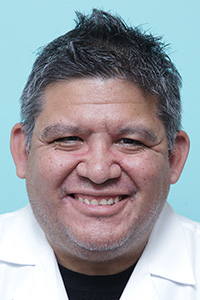Contact Us
Understanding Walking Pneumonia
Walking pneumonia is a milder form of pneumonia - a lung infection caused by bacteria, viruses, or sometimes - although rare - mold. Unlike more severe cases of pneumonia, it typically does not require hospitalization, but it can still disrupt daily life if left untreated.
“It’s known as 'walking pneumonia' because many people can still carry on with their routines,” says Dr. Rory Ulloque, a family physician and the Director of the Family Medicine Residency Program at Holy Name. “However, if not treated and monitored, it can lead to serious complications and hospitalization.”
What are the symptoms of walking pneumonia?
The symptoms often resemble those of a cold or mild flu and may include:
- persistent dry cough
- fatigue
- mild fever and chills
- sore throat
- chest discomfort
- shortness of breath or slight wheezing
How does walking pneumonia spread?
Walking pneumonia spreads quickly through respiratory droplets when an infected person coughs or sneezes. Being in close contact with others in crowded spaces — such as schools, workplaces, or public transportation — increases the risk of exposure. It’s especially prevalent in the winter since people spend more time indoors.
Even though the symptoms are typically mild, they can last for weeks. If you have lingering symptoms after two weeks, you should seek medical attention to avoid complications.
“During your visit, your provider will listen to your lungs and may order a chest X-ray, oxygen saturation test, and blood tests to detect any infections,” Dr. Ulloque says.
Who is most likely to get walking pneumonia?
Certain populations are more vulnerable to walking pneumonia, including children, seniors, and people with weakened immune systems. People with chronic breathing conditions like asthma or COPD also face higher risks. Smokers are particularly susceptible since smoking damages the respiratory system, making it easier for microbes to cause infections.
How can I prevent walking pneumonia?
To prevent walking pneumonia, Dr. Ulloque recommends staying up to date on vaccinations and practicing good hygiene, including frequent handwashing, covering your mouth when coughing or sneezing, and avoiding close contact with people who are sick. You may wish to wear a mask around sick contacts.
How is walking pneumonia treated?
If you suspect you have walking pneumonia, consult your healthcare provider promptly or contact Dr. Ulloque at 551-449-9685. Mild cases may be treated with rest, fluids, and prescribed oral antimicrobials. Getting treated early helps prevent the spread of this common respiratory illness.


